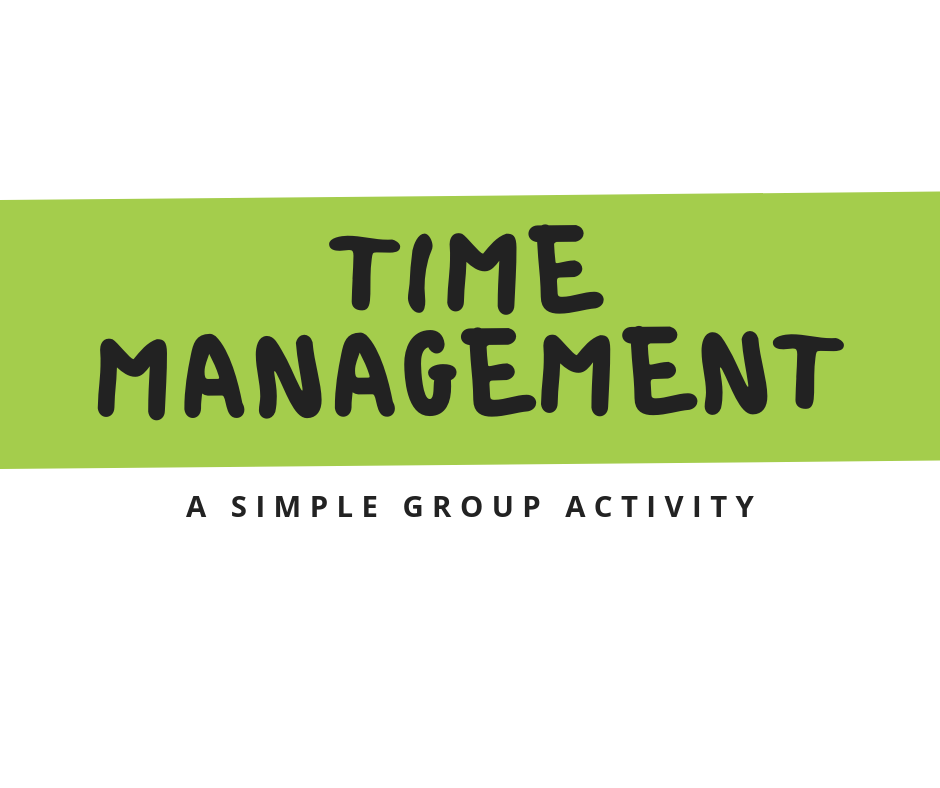A Simple Group activity on Time Management
We have a playful a little group activity for you – it kills two birds with one stone…
The team can have a bit of fun together and at the same time explore some important aspects of time management.
The To-Do list Activity:
We have a list of things To-Do we’d like you to work with. It’s a little ridiculous, so prepare yourself for a fun, team-bonding experience!
We’ll share the To-Do list with you, then we’ll give instructions on how to run this activity.
This list is ready for you to print it out or to copy onto on a large sheet of paper. The list can be adapted as much as you like – so go for it if you’re feeling creative. (Remember to make sure there’s a point value attached to every task you make up)
‘To Do’:
Do a lap around the room (5 points)
Create something for the instructor to wear, such as a hat or tie (10 points; bonus 5 points if the instructor actually wears it)
Find out something unique about each person on the team (5 points)
Sing a song together (15 points)
Make a paper aeroplane and throw it from one end of the room to another (10 points)
Get everyone in the room to sign a single piece of paper (5 points)
Count the number of pets owned by your group (20 points)
Assign a nickname to each member of the team (5 points)
Create name cards for each team member (5 points; bonus 5 points if you use your team nicknames)
Make a tower out of the materials owned by your group (10 points)
Convince a member of another team to join you (20 points)
Name your team and come up with a slogan (5 points for the name, 5 points for the slogan)
Re-create the sounds of the Amazon rainforest with the sounds of your voices (10 points)
Make a list of what your team wants out of the workshop (15 points)
Form a conga line and conga from one end of the room to another (5 points; bonus 10 points if anyone joins you)
Here’s how the simple time management activity goes:
Split everyone up into groups of 5-8.
Reveal the ‘To Do’ list. Tell them they’ve got 10 minutes to get the highest score.
Set the timer for 10 minutes and watch them go.
Tot up the points at the end to discover which is the winning team.
Afterwards, talk about what they noticed and learned when doing the task.
Things you could talk about might be:
How did the teams choose which things on the list to tackle?
Usually, people consider how long the task will take and how hard it will be and/or the difficulty level, in comparison with the number of points it could get them (the value) and that determines which tasks they prioritise.
This happens with our everyday decisions around time-management. Understandably, we tend to opt for rewarding tasks that require less effort over difficult tasks that don’t have much value attached to the outcome.
Were any choices dictated task dependencies?
E.g. On the name card task, they’d score more with nicknames. Do doing these 2 together was a way to triple the score. In everyday life – tackling tasks in batches can save time and get higher impact results.
Did any interpersonal dynamics affect the activity?
If people in the teams were familiar to one another, then doing socially riskier tasks, e.g. singing might have felt more possible. This also reflects how tasks typically get prioritised, if the task is in our comfort zone we are more likely to do it. But what is the downside to that?
Time Management powerfully boosts productivity – and who doesn’t want more of that in the workplace? How does it do this?
It means you achieve more of the important stuff.
That you enjoy doing more of the important stuff – i.e. focused, not stressy.
You do that important stuff with fewer mistakes, so spend less time fixing stuff.
Get your team performing optimally, by sharpening their time-management skills. This was just a simple exercise, we have plenty more up our sleeve. If you want to bring more group activities into the workplace, we can facilitate them for you! Contact the team today:




If you want things to be different to being ‘on the go’ every day and then collapsing into the numbness of screen time…The chances are that you are experiencing overwhelm.
When the demands placed on our attention exceed our capacity to mentally process them, the symptoms of overwhelm begin to show up.